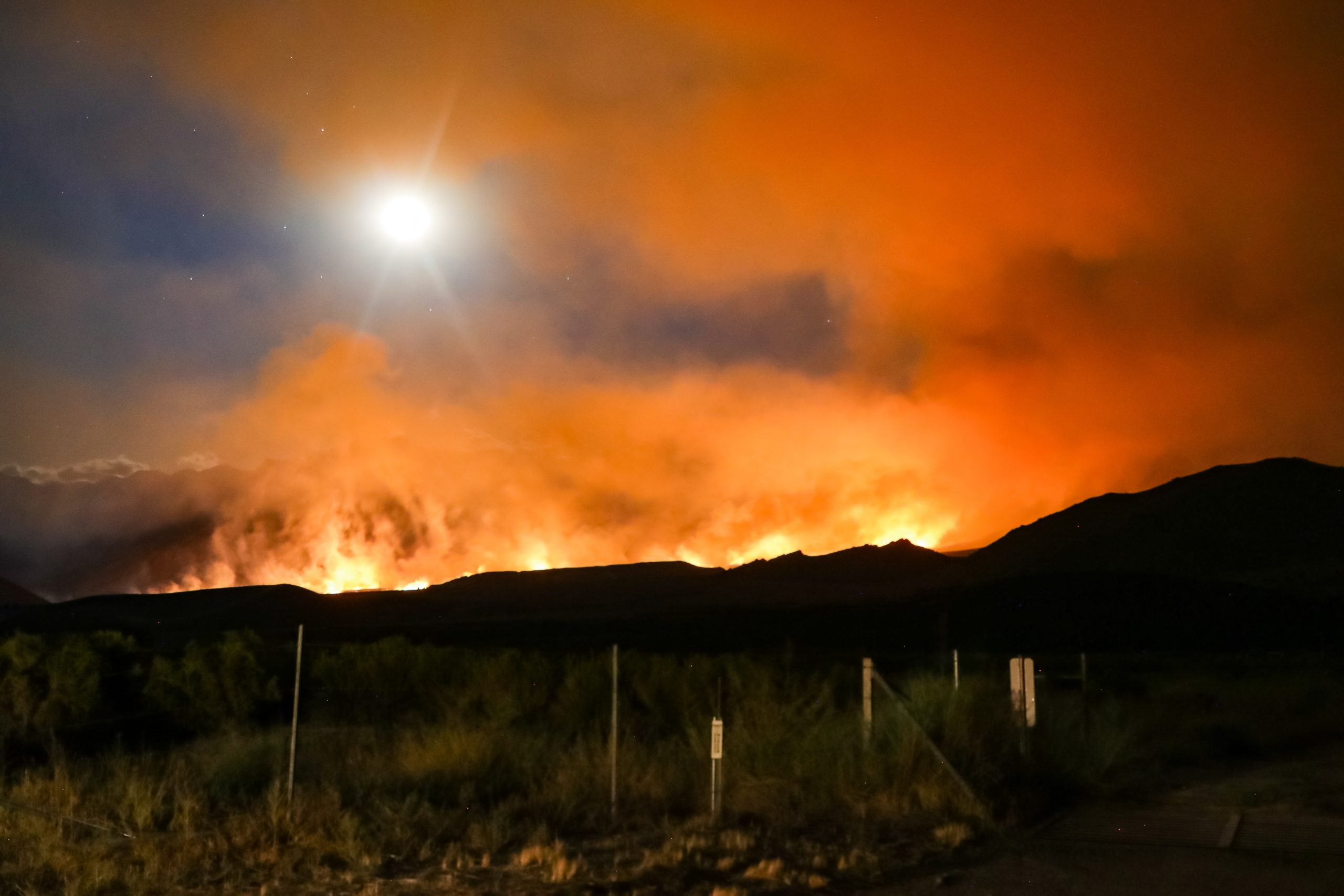What we’re watching: Weekly disaster update, July 25

We know all too well that disaster can strike at any time, in any place in the world. Some disasters make headlines; others do not. Here at the Center for Disaster Philanthropy, we keep an eye on the status of disasters worldwide and compile a list of the ones we’re tracking weekly, along with relevant disaster-related media coverage.
Here’s what we’re watching for the week of July 25, 2022.
New or Emerging Disasters
Heat wave – United Kingdom: The country recorded temperatures over 104 degrees Fahrenheit (40 degrees Celsius) for the first time ever last week, prompting the Met Office to issue a red extreme heat warning for the first time. The heat wave led to a surge in damaging fires, warped road surfaces, power cuts and disruptions to rail services. The London Fire Brigade battled 12 fires at once on July 19, making it the group’s busiest day since World War II. At least 41 properties were damaged. After two days of speed restrictions and mainline closures, rail services made steps toward returning to normal as repairs to damaged sections were made. Scientists said the heat wave was a direct consequence of climate change caused by human emissions of greenhouse gases.
Wildfire – California: The Oak Fire began on July 22 near Midpines in Mariposa County, southwest of Yosemite National Park. As of July 25, the fire had burned 16,791 acres and was 10% contained. High humidity, wind and dry vegetation make for challenging conditions for firefighters. The cause of the fire is still under investigation. Officials asked thousands of people to evacuate, and at least 15 structures have been destroyed or damaged. Governor Gavin Newsom declared a state of emergency for Mariposa County on July 23. The fire has produced significant smoke, which will reach the Pacific Northwest.
Wildfire – Texas: The Chalk Mountain Fire began on July 18 and is burning in Somervell County in north central Texas. As of July 25, the fire had burned nearly 7,000 acres and was 20% contained. The fire destroyed or damaged at least 21 homes and caused two minor injuries. Governor Greg Abbott issued a disaster declaration for 10 counties in north Texas. State agencies have responded to 205 wildfires across the state in the last seven days. The wildfires come amid a heat wave that has brought the hottest temperatures seen in the U.S. this year.
Previous/Ongoing Disasters
Flooding – Montana: Historic flooding last month hit Yellowstone National Park and surrounding areas. In addition to the damage to homes, infrastructure and the environment, the flood left a devastating impact on Southern Montana’s economy. Tourism makes up 60-80% of the annual revenue for many businesses in the affected areas, and tourists are canceling plans due to park entrance closures and damage to infrastructure. The historic flooding came when much of the U.S. West was experiencing drought and moved most of the Yellowstone area out of drought. Warmer temperatures and high amounts of rain falling on snowpack, the conditions that created the devastating floods, may occur again in the future as climate change worsens droughts and increases temperatures.
Monkeypox – Global: The Centers for Disease Control and Prevention have confirmed 2,891 cases in the U.S. and 16,836 cases globally, with 16,593 confirmed cases in countries that have not historically reported monkeypox. On July 23, the WHO declared monkeypox a global health emergency. Some experts are concerned that the declaration is delayed, hampering the ability to coordinate efforts to date. In the U.S., officials confirmed the first two cases of monkeypox in children. In Europe, the European Medicines Agency has recommended expanding the label of a smallpox vaccine to include protection against monkeypox amid a race to improve access.
Humanitarian Crisis – Ukraine: As of July 19, there have been more than 9.5 million border crossings from Ukraine since Feb. 24, according to the United Nations High Commissioner for Refugees. As of July 20, United Nations (UN) agencies and partners have reached 11 million people with life-saving assistance. Millions of Ukrainians live in damaged homes or buildings that cannot protect them from harsh winter conditions. The United Nations Office for the Coordination of Humanitarian Affairs (UNOCHA) Winterization Plan targets 1.7 million people needing early winterization support, including items such as thermal blankets and repairs to collective centers and damaged homes.
According to Candid, 1,366 grants worth $1,321,206,941 have been granted so far, with an additional 180 pledges worth $707,008,080. Funders can share their grants data with them by emailing egrants@candid.org.
For more, see the Ukraine Humanitarian Crisis disaster profile and Ukraine Humanitarian Crisis Recovery Fund.
Worldwide – Coronavirus:
Key facts as of July 25:
- Worldwide, cases have surpassed 575 million.
- There have been more than 545 million recoveries and more than 6.4 million deaths.
- The highest number of cases are in the U.S. (92.1 million), followed by India (43.9 million), Brazil (33.5 million) and France (33.5 million).
- Worldwide, 66.9% of the global population has received at least one dose of a COVID-19 vaccine. This number drops to only 19.7% in low-income countries.
Other notable news:
- Scientists are narrowing in on why some people keep avoiding Covid. However, the latest version of omicron, BA.5, is very good at spreading and evading vaccine protection.
- The number of Australians in hospitals with COVID-19 is the highest since the emergence of the coronavirus. The BA.4 and BA.5 strains have become dominant, and they can evade immune protection.
For more, see the COVID-19 Coronavirus disaster profile.
U.S. Midwest Low-Attention Disasters
The Midwest is regularly faced with low-attention disasters that affect people across the region. CDP’s Midwest Early Recovery Fund (ERF) effectively funds efforts that catalyze equitable disaster recovery.
These are some of the latest disasters the ERF team is monitoring:
- Firefighters in Blaine County, Oklahoma, battled a wildfire with back-burns – burning into the fire to remove fuel sources. The fire burned nearly 10,000 acres and damaged at least four structures. The state’s Army National Guard is supporting the effort, and there is an outpouring of community support.
- The current drought in Missouri is hurting all agricultural sectors south of the Missouri River. In response, Missouri Governor Mike Parson issued an executive order allowing the state government to provide additional resources amid the record heat wave and widespread drought.
Complex Humanitarian Emergencies – Nigeria
Many places worldwide are experiencing emergencies caused by conflict, climate change, drought, famine, economic challenges and other conditions that combine to create a complex humanitarian emergency (CHE). CDP maintains complete profiles on several CHEs, and what CDP considers Level 1 CHEs are profiled in this weekly blog and tracked.
A large-scale humanitarian response has been in place since 2016 in northeast Nigeria, where the needs remain severe. Insecurity linked to armed groups, including the terrorist group Boko Haram, has disrupted livelihoods and led to displacement.
Persistent armed conflict in June between government forces and non-state armed groups in the northeastern states of Borno, Adamawa and Yobe affected hundreds of internally displaced persons and host community members. In addition to conflict, high inflation across the country impacts food prices, resulting in people needing urgent food and livelihood support.
According to FEWS Net, humanitarian needs in Nigeria are expected to be atypically high during the June to September lean season, particularly in the northeast and northwest. The high needs are driven by conflict and poor macroeconomic conditions. CARE and Plan International conducted a rapid gender analysis in northeast Nigeria in June 2022 and found the crisis has disproportionately affected women and adolescent girls.
Militants who have been restricted to Nigeria’s northeast for years are looking to expand their influence into other parts of the country. In June 2022, more than 30 people were killed in an attack on a Catholic Church in the southwestern state of Ondo. The attack in Ondo, a state previously seen as one of Nigeria’s safest, was carried out by extremists under the Islamic State West Africa Province group.
What We’re Reading
- Which Americans Are Most (and Least) Prepared for Disasters? – U.S. News: A new study suggests that women, people with kids under 18, renters, the poor, and Black and Asian Americans are the most vulnerable to weather disasters. The study also found that people who had received information about preparing for a disaster were more likely to be prepared.
- Extreme heat prompts alerts in 28 states as Texas, Oklahoma hit 115 – The Washington Post: Heat advisories and excessive heat warnings were issued last week, affecting more than 105 million people in 28 U.S. states. Texas and Oklahoma are also battling wildfires and enduring drought.
- Scant hope for relief as repeated heat waves scorch Pakistan – The New Humanitarian: A record-breaking heat wave in South Asia is the third this year in Pakistan, leaving people struggling to cope. One study shows climate change has made heat waves in the region 100 times more likely. There are concerns regarding Pakistan’s preparedness for the changing climate.
- Millions could die without ‘urgent’ funding as ‘catastrophic famine’ looms in East Africa, IRC says – ABC News: The International Rescue Committee (IRC) issued a “Crisis Alert” update to its annual Emergency Watchlist report, noting Somalia is of specific concern with the potential of famine more severe than the one in 2011 that killed an estimated 260,000 people. The organization said, “the international community needs to look forward, applying a no-regrets approach.”
- Create Cultures of Care to Transform Philanthropy From the Inside Out – PEAK Grantmaking: Our world has endured a global pandemic, climate collapse and widening inequality in the last three years. These events have taken a toll on people, and people working in philanthropy are not immune. Richael Faithful, a Healing Justice Practitioner, describes this challenging context and outlines four areas to improve well-being.
The Turtle Mountain Band of Chippewa Tribe welcomed the birth of a rare white buffalo calf in June.
